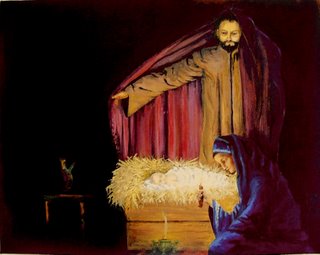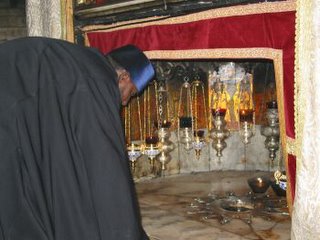
I have often struggled with the idea of conforming to Christ: I think, "How can I conform, I am so weak? I can barely will the idea, much less handle thinking on an emotional or practical level about the reality of it."
I then say a prayer for help and enlightenment. Why the fear? I think fear comes because Our Lord was prophesied to be, and was beyond measure, a Man of Sorrows. Crowned in His crucifixion, Jesus' life on earth was, to the outside observer, a life fraught with much that would break the heart of a lesser man. He was a man born far from home; a man who lived in relatively poor conditions. He chose, as God, to live in what was considered the 'low-class, working-class' area of Israel: He chose to identify with the despised and the low of the world and to suffer the ignomy that accompanies such a choice. As a Rabbi, a Teacher, he confronted the rot and evil which had grown up among those in religious and political positions- and this kind of confrontation inevitably brings stress and persecution in its wake. He did not turn from sorrow, or 'live above it' - a nice way to say you are ignoring it- instead, He wept with those who sorrowed, and brought rejoicing forth from the sorrow when He found faith in the grieving.
All of these choices of God, and the events in His life, are viewed by us as through the wrong end of the telescope: as if they are enacted on a stage, far away from our lives. This is natural, I suppose, for the obvious connection between my life and the life of Christ does seem like a long thread, covering long distances: the distance between a Creator and creature. It is truly a distance we cannot cross ourselves, that distance between how Christ lived His life and we live ours.
God Himself comes to us, the purpose being because He loves us with such a passion as to wish us to be conformed to Him, to become small, but true visions of His heart. He wants to be with us, and to bring us home with Him. To do this, He made Himself a bridge between earth and heaven- I am thinking of St. Catherine of Siena's vision of Christ as a bridge which is found in her
Dialogues, or talks with God. Reading the understanding given her in ecstasy of this Divine Bridge is worth the effort. I cannot reproduce the beauty of it here in this short essay.
Nevertheless, He is a bridge: and He comes to us, and wishes to remain close. He is gentle, and gently calls us to conform our lives to His: a baby in Our Lady's lap, a lover of the poor, a simple and hardworking person, a person who understands deeply the sorrows of this life, in our own as well as others; a person who does not turn from nor fear those sorrows, but looks to them as opportunities to become more like Him in charity. He calls us to lay down our lives, our desires, in His service- as He did in the Father's service- and he beckons us to follow in His footsteps on the dusty, messy and dirty road through a landscape so far from perfection, but in need of His light and joy. Finally, He asks us to accept crucifixion: and this comes differently for each person, for God knows each person more intimately than he knows himself.
The essence, though, of crucifixion is the giving over of the self- of the will- to the service of God and for the love of one's neighbor. This does cause pain, and in times of the persecution of Christians, it causes death like unto Christ's. There are other kinds of crucifixions, though, and one only has to learn the lives of the saints in all the ages to understand how many types there are.
All this frightens me.
The answer comes to me, like wisp of frankincense smoke: to conform to Christ cannot be done through one's natural will and abilities: the foundation and beginning must be deep love of God, as Christ has for the Father and the Holy Spirit. This love cannot be earned, but must be earnestly begged of Him who gives gifts lovingly, mercifully, and in greatest abundance. We must start with this love, we must desire it, and then our foundation for conformation in Christ is begun. We cannot hope to get anywhere besides either failure or massive pride (like the Jansenist heresy) without this gift of Love.
After we have asked for, been given, and responded to the graces of God, namely His Love, then we begin to understand that for those who love God, this life on earth, this exile in a valley of tears, is itself a conforming to Christ. You see, if you love God with your heart, soul and mind, you will suffer tremendously because this love cannot be fully consummated in union until you "know as you are known". Perhaps, I don't know, some of the great contemplative saints reached this union while still living on earth: but I think that they still suffered a sense of exile, and suffered the uncertainty of those who lived around them. In heaven, 'your shores are safe and secure' (A'Kempis).
So our daily lives, each moment, becomes a chance for conforming to Christ, in that each moment suffused with the love of God while in exile on this earth is a moment that is imbued with the life of Christ.
Have I given a picture of melancholy and morose -looking Little Christs? If I have, I have failed in explaining, so I will add this last: The love of God is Joy itself. The great mark of the Christian, or
one-of-Christ's, is great joy and love in both times of sorrow and joy. Not the superficial ignoring of sorrow, or escapism, but a deep and solemn joy and a deep love and hope that exists ever under tears or the weight of life. Our shoulders may be scarred or bowed, but our eyes still sparkle like a child's in his Father's embrace. And there is peace, a peace in knowing that all happens in our lives for our ultimate good. This peace is only possible as a gift from God, a gift won by our sincere asking.
For those of the world, the Cross is foolishness, for they see it as a purposeful impoverishing of oneself for naught. For those who love God, the Cross is everything. The Cross is part of a personal and love relationship, it cannot be understood otherwise. It strips us of the dross of sin, it allows us to know our Saviour as only those who have loved and suffered together can know one another. It is not a stumbling block but a purgatory on earth, a place of fire, that purifies us and mysteriously builds in us the love of God in proportion to how much we allow it to turn our hearts from created things in this world. Everything we think or do, through the Cross, becomes the love of others through first loving God, like a man who tells another the hard truth, in love, in the face of persecution from the very person he is trying to help; or he who stands for the Faith and for true morality, at great loss of worldly opportunity for hismself.
If you lose your life for God, you will save it. If you look to garnish and coddle yourself, you will come to naught.
I'm a little less frightened now and more focused on love than fear. Oh, yes! "Perfect love casts out fear". May God perfect His love in me, and in all who, knowingly or not, search earnestly for Him.





